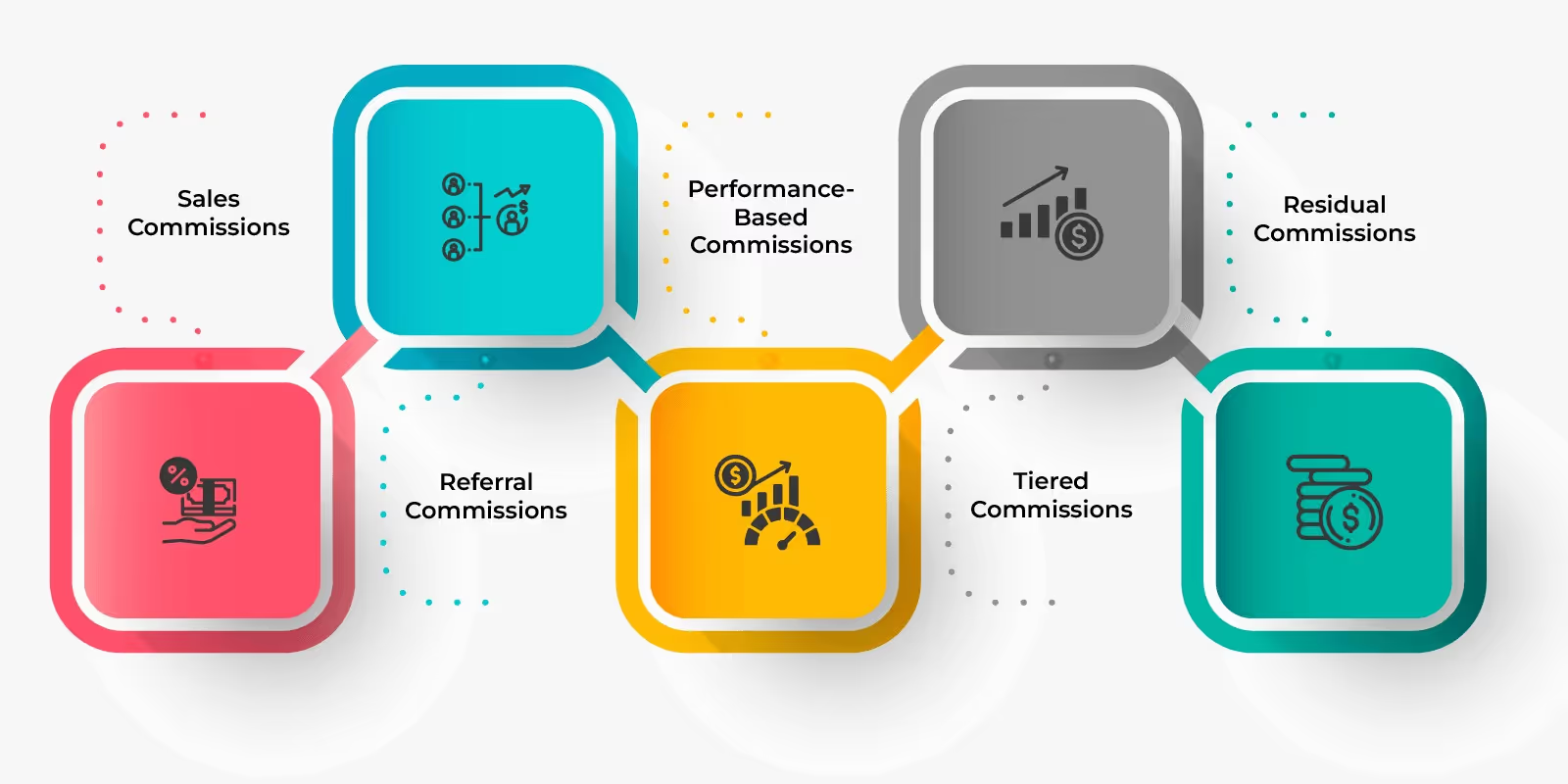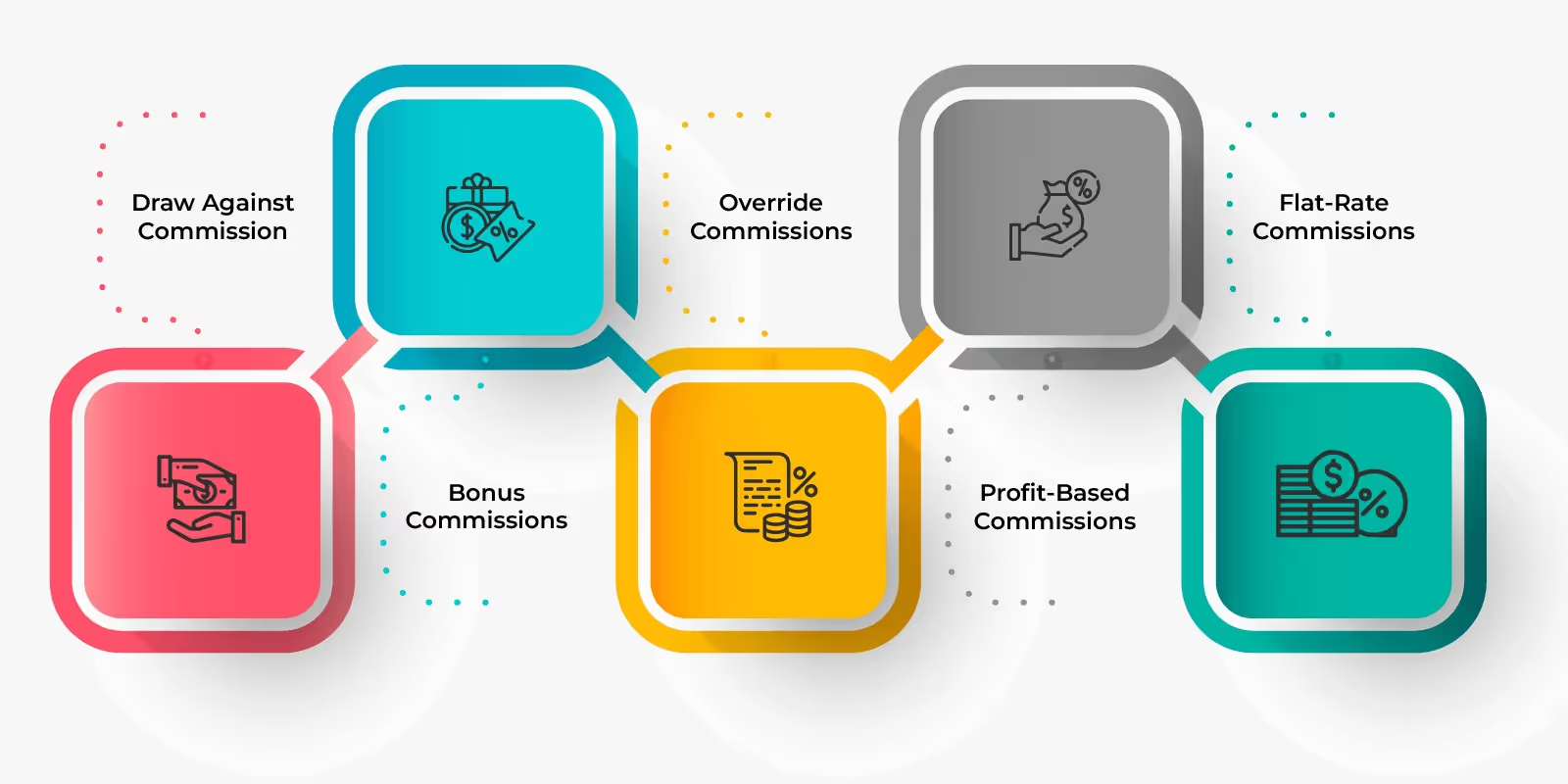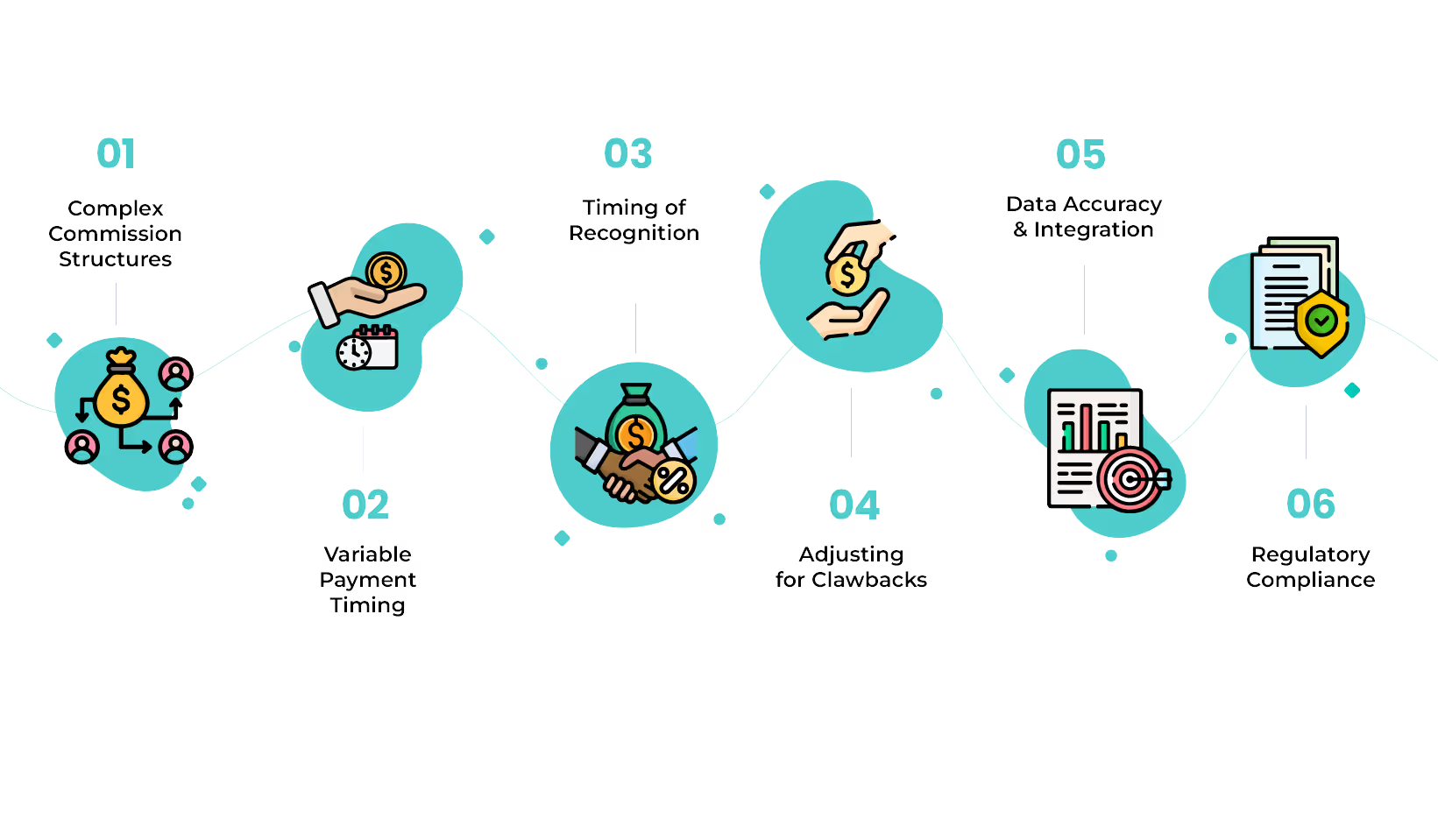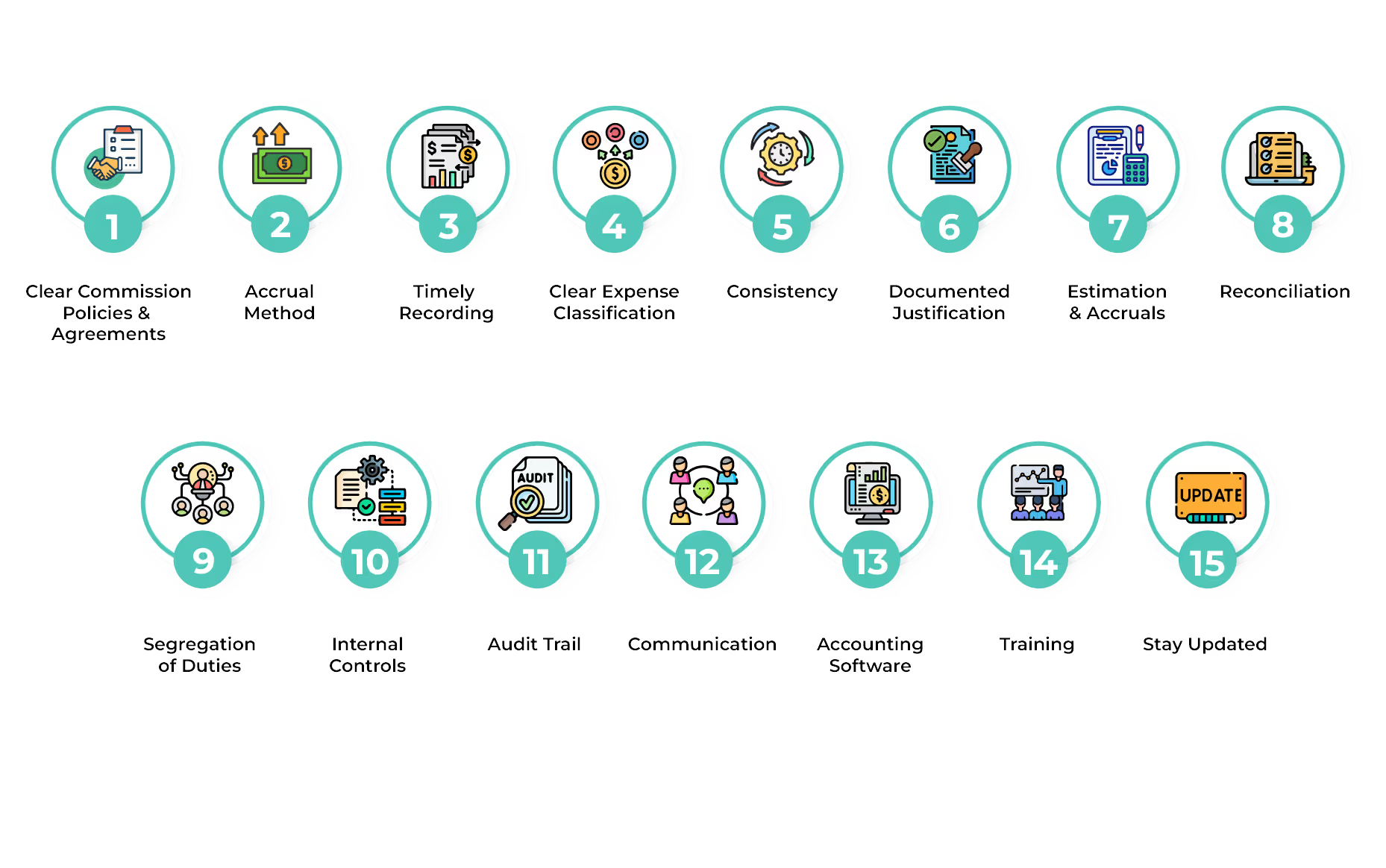
Blog
A Guide to Master Commission Expense Accounting
August 18, 2023


Key Insights
In the realm of modern business, sales commissions play a pivotal role in motivating and rewarding sales teams for their efforts in driving revenue.
However, the financial aspects of commission expenses can be complex and require meticulous accounting to accurately reflect the financial health of a company.
This article aims to break down commission expense accounting, providing a comprehensive overview of the process, best practices, and key considerations
Understanding Commission Expenses:
Commission expenses are a form of variable compensation paid to sales representatives or employees based on the value of sales they generate.
These expenses are typically a percentage of the revenue from the sale and serve as an incentive for sales teams to perform well, highlighting the essential role sales teams play in driving company growth and profitability.
Accurate accounting of commission expenses is crucial for several reasons:
- Financial Reporting: Properly accounting for commission expenses ensures accurate financial statements, reflecting the true cost of sales and the overall profitability of the company.
- Internal Control: Transparent commission expense accounting helps prevent errors, fraud, and discrepancies in compensation calculations.
- Regulatory Compliance: Many accounting standards, such as the Generally Accepted Accounting Principles (GAAP) and International Financial Reporting Standards (IFRS), require companies to accurately report commission expenses.

What are Commissions: Cogs or Expenses?
Commissions are generally considered an expense, not a part of the Cost of Goods Sold (COGS). While commissions are a cost to the business, they are more closely tied to the sales effort rather than the direct production of goods or services. Therefore, they are classified as an operating expense.
Here's a breakdown:
COGS includes the direct costs of producing or acquiring goods for sale. This typically includes things like raw materials, labor, and manufacturing overhead.
Commissions are payments to salespeople to generate sales. They are considered operating expenses because they are directly related to the sales process but not the actual production of the goods or services.
Why the distinction?
Profitability: Understanding the difference between COGS and operating expenses helps businesses calculate their gross profit margin and operating profit margin.
Inventory Valuation: COGS is used to determine the inventory value on the balance sheet. As an operating expense, commissions would not be included in this calculation.
Financial Reporting: Accurate categorization is essential for preparing financial statements that comply with accounting standards.
Types of Commission Expenses

#1 Sales Commissions
These are payments made to sales reps for closing deals. It’s the classic "you sell, you earn" approach.
#2 Referral Commissions
If someone brings in new customers, they get a cut. Think of it as a thank-you for spreading the word.
#3 Performance-Based Commissions
These kick in when specific targets are hit. It’s all about rewarding top performance.
#4 Tiered Commissions
The more you sell, the higher your commission rate. It’s a way to motivate those extra sales.
#5 Residual Commissions
You earn ongoing commissions for long-term clients. It’s like getting paid repeatedly for one sale.

#6 Bonus Commissions
Extra cash for going above and beyond. It’s a little something extra on top of your regular commission.
#7 Draw Against Commission
You get an advance on future commissions. It’s like a paycheck now, with the commission balancing out later.
#8 Profit Margin Commissions
These are based on the profit of the sale, not just the sale itself. It encourages profitable deals.
#9 Flat Rate Commissions
A set amount per sale, no matter the size. Simple, straightforward, and predictable.
#10 Override Commissions
Managers earn a percentage of their team's sales. It’s a way to reward leadership and team success.
Steps in Commission Expense Accounting:
Commission expense accounting involves recording and recognizing the expenses related to sales commissions paid to employees or external agents based on various Sales Commission Structures.
Here are the general steps involved in commission expense accounting:
Identify Commission Agreements and Terms:
Understand the commission agreements in place, including the terms, rates, and conditions for paying commissions to employees or agents.
Record Sales Transactions:
Record the sales transactions made by the employees or agents. This could involve the sale of products, services, or other offerings.
Calculate Commissions:
Based on the commission agreement terms, calculate the commission payable to each employee or agent for their respective sales transactions.
Create Commission Expense Journal Entries
Create journal entries to recognize the commission expense. The following entry is commonly used:
Accrual vs. Cash Basis:
Decide whether to recognize commissions on an accrual basis (when they are earned) or a cash basis (when they are paid), while also considering the implications of non-recoverable draw commissions on the overall compensation structure.
Reconciliation:
Reconcile the commission expenses recorded in the financial statements with the actual commission amounts paid to ensure accuracy.
Periodic Reporting:
Include commission expenses in financial reports, such as income statements, balance sheets, and cash flow statements, as appropriate.
Employee or Agent Payments:
If not paid immediately, record the payment of commissions to employees or agents when it occurs.
- Debit: Accrued Commissions Payable (if applicable)
- Credit: Cash (or Bank Account)
Adjustments and Reversals:
Make adjustments or reversals if commission amounts need to be corrected due to errors or changes in agreements.
Amortization of Commissions:
If commission expenses are related to future benefits (e.g., subscription-based sales), amortize the expenses over the period of benefit.
Disclosure:
Provide necessary disclosures in financial statements about commission expenses and related arrangements, as required by accounting standards.
Compliance and Documentation:
Ensure compliance with relevant accounting standards and regulations and maintain proper documentation for audit purposes.
Year-End Reconciliation:
Reconcile the total commission expenses recorded throughout the year with the actual payments made to employees or agents.
.avif)
How to Account for Commission Expenses
Commission expenses should be recorded as a cost of sales or operating expenses on your income statement. This involves debiting the commission expense account and crediting the accounts payable or cash, depending on whether the commission has been paid or is still owed.
Examples of Commission Expense Accounting
If a sales rep earns a $500 commission, you would debit the commission expense account for $500 and credit either accounts payable (if not yet paid) or cash (if paid immediately). This reflects the cost of the commission on your financial statements.
Recording Commission Expense in QuickBooks
In QuickBooks, you can record commission expenses by creating an expense transaction. Choose the commission expense account, enter the amount, and assign it to the appropriate customer or sales rep. This keeps your books organized and makes it easy to track commissions.
Journal Entries to Adjust Commission Expenses
If you need to adjust commission expenses, you’ll create a journal entry. For example, if you overpaid a commission by $100, you’d debit accounts payable and credit the commission expense account by $100 to reflect the correction in your financial records.
It's important to note that the specific steps and their sequence may vary depending on the company's accounting policies, the complexity of commission agreements, the accounting software used, and the integration of sales SPIFF (Special Performance Incentive for Field Force) programs into the overall commission accounting process. Additionally, a tiered commission structure can introduce further intricacies into the calculation and reporting processes.
Also, it's advisable to consult with accounting professionals or adhere to accounting standards in your jurisdiction while performing commission expense accounting.
Challenges in Commission Expense Accounting:
Commission expense accounting can be complex and challenging due to the various factors involved in calculating, recording, and reporting commissions, especially when holding the sales team accountable. Managing complex commission structures, variable payment timing, and the timing of recognition can be daunting tasks. This is where utilizing a SAAS commission calculator can significantly simplify the process and improve accuracy.
Here are some challenges and considerations to keep in mind:
- Complex Commission Structures: Many companies have intricate commission structures that involve different tiers, rates, and eligibility criteria. Managing and accurately calculating commissions based on these structures can be challenging, especially when changes are frequent.
- Variable Payment Timing: Commissions are often paid on different schedules, such as monthly, quarterly, or annually. Accounting for these variable payment timings while ensuring accurate accruals and disbursements can be complex.
- Timing of Recognition: Deciding when to recognize commission expenses can be challenging. Depending on the accounting principles (e.g., accrual basis), commissions may need to be recognized when they are earned rather than when they are paid. This requires estimating future commission obligations accurately.
- Adjusting for Clawbacks: In some industries, commissions may need to be adjusted or clawed back if the associated sales are reversed or canceled. Managing these adjustments and ensuring that the correct amounts are reflected in financial statements can be tricky.
- Data Accuracy and Integration: Commission calculations often rely on accurate and timely sales data. Integrating data from different sources and systems can be challenging, and inaccuracies can lead to errors in commission calculations.
- Regulatory Compliance: Depending on the industry and jurisdiction, there may be regulations and guidelines that dictate how commissions should be accounted for, and aligning with a well-defined sales compensation strategy becomes crucial. Ensuring compliance with these regulations is important to avoid legal and financial risks.

In conclusion, commission expense accounting involves numerous challenges related to complex structures, timing, estimation, accuracy, compliance, and communication.
financial reporting (Organizations need to implement robust processes, systems, and controls to effectively manage these challenges and ensure accurate financial reporting.)

Best Pratices in Commission Expense Accounting:
Proper commission expense accounting is crucial for maintaining accurate financial records and ensuring compliance with accounting standards.
Here are some best practices to consider:
- Clear Commission Policies and Agreements: Ensure that your company has well-defined commission policies and agreements in place. These documents should outline how commissions are calculated, when they are earned, and any conditions or deferred commission thresholds that must be met for commission payment.
- Accrual Method: Use the accrual accounting method to recognize commission expenses in the same period that the related sales are recorded. Implementing sales commission best practices ensures that your financial statements accurately reflect the expenses associated with the revenue generated, promoting transparency and alignment with accounting standards.
- Timely Recording: Record commission expenses promptly in your accounting system. Delayed recording can lead to inaccurate financial statements and may result in compliance issues.
- Clear Expense Classification: Categorize commission expenses properly in your chart of accounts. This allows for accurate tracking and reporting of commission-related costs.
- Consistency: Apply consistent methods and policies for commission expense recognition across all departments and sales teams. This ensures fairness and reduces the risk of errors.
- Documented Justification: Maintain documentation that supports the calculation and recording of commission expenses. This includes sales reports, commission agreements, and any other relevant records.
- Estimation and Accruals: If commissions are earned but not paid by the end of the accounting period, create an accrual entry to reflect the estimated commission expense. Adjustments can be made later when actual payments are made.
- Reconciliation: Reconcile commission expense accounts regularly to ensure that the recorded expenses match the actual payouts made to employees or sales agents.
- Segregation of Duties: Separate the responsibilities for commission calculations, approvals, and accounting entries. This segregation of duties helps prevent errors and fraudulent activities.
- Internal Controls: Implement internal controls to mitigate the risk of misstatements or fraud related to commission expenses. This includes periodic reviews and approvals of commission calculations and payments.
- Audit Trail: Maintain a clear audit trail for commission transactions, from the initial sale through to the commission payment. This transparency is important for both internal and external audits.
- Communication: Foster effective communication between sales teams, finance, and accounting departments. This ensures that everyone understands the commission policies and that accurate information is shared.
- Accounting Software: Use reliable accounting software that can handle commission expense calculations, accruals, and reporting efficiently. This reduces manual errors and improves overall accuracy.
- Training: Provide training to relevant staff involved in commission calculations and recording. This ensures that they understand the company's commission policies and the proper accounting procedures.
- Stay Updated: Keep up to date with relevant accounting standards (e.g., ASC 606 for revenue recognition) and any changes that could impact commission expense accounting.

Remember that specific practices can vary based on the nature of your business, industry, and local regulations. It's advisable to work with an accounting professional or consultant to tailor these best practices to your company's unique needs, considering factors such as 'forecast vs projection' accuracy for informed decision-making.
Commission expense accounting is a critical aspect of financial management, directly impacting a company's profitability and financial reporting.
Understanding the nuances of commission structures, accurately calculating and recording commission expenses, and adhering to best practices are essential for maintaining transparency and integrity in financial operations. The incorporation of a Win percentage calculator further enhances these efforts, providing a comprehensive tool for evaluating sales performance and ensuring that commission structures align effectively with the achieved success rates of each representative.
By following the steps outlined in this guide, businesses can navigate the complexities of commission expense accounting with confidence, ultimately contributing to their long-term success.
To learn more about how Kennect’s Sales Performance Management solution can help you with complex commission accounting, book a demo today!
ReKennect : Stay ahead of the curve!
Subscribe to our bi-weekly newsletter packed with latest trends and insights on incentives.
Thank you! Your submission has been received!
Oops! Something went wrong while submitting the form.
Your data is in safe hands. Check out our Privacy policy for more info















